For exactly one quarter of a century, Fuse has occupied a unique position in the local and international nightlife. BRUZZ went to raise a glass to the anniversary with resident DJ Pierre and regular visitor A. Brehme, but first they gave us an insider’s tour of the dancefloor and behind the scenes at the techno club in the heart of the Marolles. “Fuse was the catalyst that brought a breath of fresh air to Brussels’s nightlife.”
© Barbara Oorts
A Fuse veteran, Pierre Noisiez – Pierre for short – has just sent us a few old photos from the time when the club at rue Blaesstraat 208 was still called Le Disque Rouge. It was a very popular place in the 1980s. Fuse became one of the success stories for the West-Flemish nightclub entrepreneurs Peter Decuypere and Thierry Coppens, who opened a techno club here in April 1994. “People who moved here knew what they wanted,” says Pierre, who has been here from the very beginning and (in contrast to the two founders) has stayed on for the full 25 years, now not only as a DJ but also as a booker. Decuypere had discovered Pierre at the Zanzibar, a disco in Kortrijk, and after peregrinations at his club 55 in Kuurne and at Café d’Anvers, managed to tie him to Brussels definitively. BRUZZ sat down with him and the Brussels local Arnaud Roobaert, who discovered Fuse as a teenager. At first he was rather sceptical, but his suspicions vanished into thin air when he heard Pierre at the mix table. Ten years ago, Arnaud played here for the first time as A. Brehme. Since then he has shared many programmes with his hero and he is also working day shifts, during which he books the plane tickets, hotels, and restaurants for the international guest DJs.
After 25 years, nobody can deny Fuse’s merits, but the first months were a catastrophe. Why did things go so badly at the beginning and what was the turning point?
Pierre: There were too few clubbers, and the people who did come weren’t familiar with techno. Two scenes dominated the club world then: the “Dutch”, with examples like Café d’Anvers, where the music was cheesier and more commercial, and the harder type, like Cherry Moon. We were doing something that didn’t exist yet in Belgium and we had to create a whole scene by ourselves. There were occasional raves, but no real clubs actually played any club music. Our audience was very alternative, of the type that now goes to Recyclart. They would often just avoid the techno in the big hall downstairs and come to the smaller hall, where I played house. Peter took the radical decision to close the upstairs hall. It was supposed to be a techno club, after all. The change happened when Laurent Garnier arrived. He was the first person to fill the club to capacity and to get people talking about it. From the mid-1990s, techno gradually became more popular and we were packed every weekend. The punters would arrive early and there were often long queues at the door.
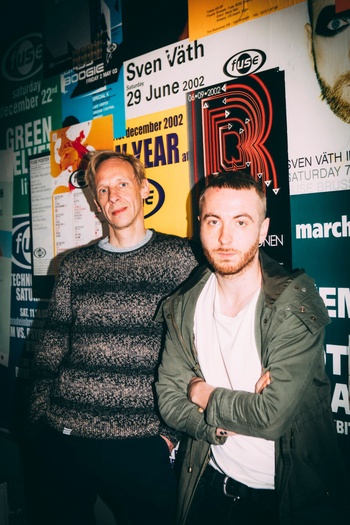
© Barbara Oorts
| Pieere (left) and A. Brehme share some Fuse history
During those golden years, you were often able to book big names. How did you deal with the breakthrough of electronic music among the general public?
Pierre: By diversifying on time. When techno waned around the year 2000, we focused more on house. We realized that we couldn’t keep repeating ourselves. Moreover, the most famous DJs would play in bigger venues and at festivals. We simply had to evolve without losing our identity. There was even a period when we played drum ‘n’ bass upstairs. When we discovered that in Cologne, thousands of clubbers were going wild to minimal techno every weekend, we introduced that genre here in our Lessizmore nights.
A. Brehme: My generation was very lucky in that when we started going out, we could take advantage of a scene that was well-established both in terms of depth and breadth.
Pierre: I have always thought it is very important not to pin myself down to one style. As a young teenager, I played funk and black music. When I got a mix table, I switched to disco and eventually to electronic music, but I continue to be open to new things. It makes everything that much more exciting. That’s why I still switch between genres, but also between warm-up and closing slots, between the downstairs hall with the bigger names and the upstairs hall where there is a more adventurous sound.
How did you two meet?
A. Brehme: The Lessizmore nights were a staple night out for me and my group of friends. Pierre was always the last DJ to play, often only at 7 am, and he always sent us home with a huge smile on our faces. He introduced us to music that we had never heard before. To me, he was not just the kind of guy that you would chat to. He was somebody that you genuinely listened to. When I started coming here more often, our relationship became friendlier. (Laughs)
Pierre: I first heard Arnaud’s music at a DJ contest and his set was a cut above the rest. We’ve been asking him back ever since.
Fuse is now also a record label and it organizes parties outside the club itself. Was that a necessity?
Pierre: Yes, because it generates extra dynamism and visibility. The label is a global calling card that we also use to promote the Belgian scene. Hosting stages on location is a way to broaden our audience. At the Crossroads festival, we present innovative music that is an extension of our trademark style. And birthday parties like the one coming up at Palais 12 are an opportunity to invite bigger names to play sets for us.
A. Brehme: At Fuse on the Beach, on the pier in Blankenberge, I saw how happy people were that we came to them, so that they didn’t have to commute for an hour and a half each way to come to us. There was definitely added value to presenting the Fuse quality label outside the club context.
In the past, Fuse was a hotspot to meet friends. Now that everyone is connected all the time, it's a place to just party.
What are the biggest changes that you have noticed from within the DJ booth over the past few years?
Pierre: In the early days, the atmosphere in the hall was more sombre. We installed more light to make it “cosier”. The current trend is going back to a more underground feeling. Social media have also had an effect. In the past, Fuse was a real hotspot where friends would meet. Now that everyone is connected all the time and wherever they are, it has become more of a place to party and to dance. The secret is to stay close to the dancefloor. Since the recent renovation, that is literally the case. The closer proximity between the hall and the DJ creates a stronger participative dynamic.
A. Brehme: In the previous configuration, the DJ had an overview of the whole dancefloor, which was very useful during warm-up sets. But when you play for a full house, it is quite easy to get sucked into the whole mood as a DJ.
The house club Café d’Anvers was forced to close down a few months before its 30th birthday. Is that a conceivable scenario here?
Pierre: After 25 years, we have become an institution that it is difficult to imagine going without. We are firmly anchored in the fabric of the city.
A. Brehme: Fuse is part of the DNA of every person of my generation who goes out. Move the club to any other city in Belgium and it wouldn’t be the same.
Pierre: And in any case, the closing of Café d’Anvers was primarily due to the gentrification of the city. Nightspots in more isolated neighbourhoods are generally quite scarce, even in Brussels. And given the profusion of regulations nowadays, it would be impossible to open a club like Fuse in a residential area. Fortunately, our relationship with our neighbours has always been excellent. We have always done everything possible to keep the noise and inconvenience to a minimum.
Finally, what has Fuse meant to you and to the local scene?
Pierre: Everything. It was the club that introduced techno to Belgium and saw its international breakthrough. It was the pioneer of a whole scene that did and continues to thrive thanks to the city’s diversity.
A. Brehme: For my generation, it was the catalyst that brought a breath of fresh air to Brussels’s nightlife. I also work in the nearby record shop Crevette Records, one of the many new places in Brussels that might not have opened if it weren’t for Fuse. People who met each other at the club have spent the past few years leaving their mark on the neighbourhood and have adopted Fuse’s values.
Pierre: At a certain point there was a couple who came here regularly and we called them Les Mariés de Fuse. They met each other on the dancefloor and celebrated all of their anniversaries here in their wedding clothes. We don’t see them as often now anymore. I hope that doesn’t have anything to do with the state of their marriage. (Laughs)
Free 25 Years Fuse after party with Seth Troxler 4/5, 11.00, Fuse
Read more about: Brussel-Stad, Muziek, 25 jaar Fuse
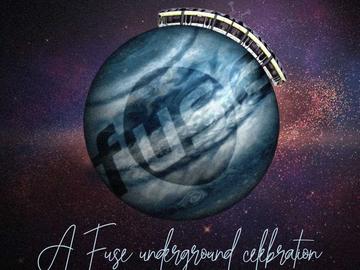
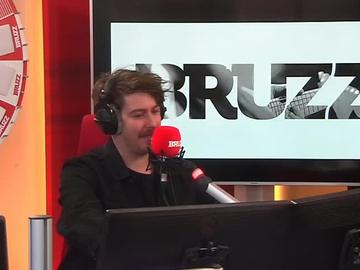
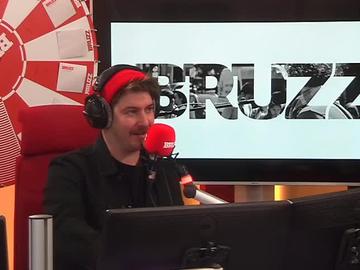
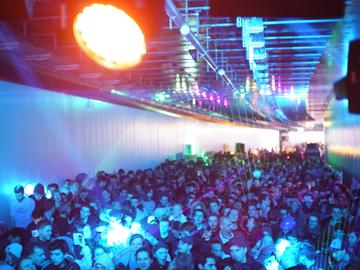
Fijn dat je wil reageren. Wie reageert, gaat akkoord met onze huisregels. Hoe reageren via Disqus? Een woordje uitleg.